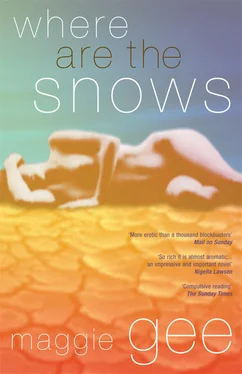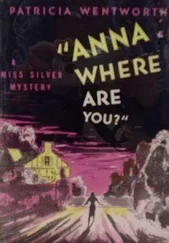I touch the person gently on the shoulder. No response. I see the hair which the cowled neck hides is long. It’s a woman; I feel a small rush of relief. Women are less frightening. I bend over and touch the grey hair. ‘Pardon…’
As I say it I remember that’s not what you say. But she stirs from the ground, her spine unbends, with reluctance and a slight creaking of wrists the thin arms lift the heavy torso; an old woman; long wavy grey hair, the lightless yellowish-grey of the poor who can never afford to get their hair done; a tired face, very thin; perhaps a faint remnant of crazy beauty; of course I have never seen her before, but as I look into the startled pale eyes I see a horror beginning there, a look of terrified recognition, as if I am a monster come to torment her, a terrible monster who’s been pursuing her, and she staggers away from me on her knees, which refuse to unbend after kneeling so long, she is half-crawling, half-scuttling away with a peculiar crab-like motion, saying ‘ No… no ’ as she does so, and she goes ten yards in this terrifying manner before she manages to get to her feet, she looks round once briefly, then runs away, and by the time she has got to the end of the room her gait is quite normal, she’s not crippled at all.
I stand there feeling horribly disturbed. As if I had prised someone from under a shell. Why should she have felt such fear? Perhaps she just couldn’t bear to be touched, but it was as if she recognised me, her eyes — which were a rather striking colour, a pale hazel-ish brown in the chalk-white face — had a look of riveted, shocked attention which only then turned to absolute terror.
I’m sure I didn’t know her. Unless it was someone from the distant past, but there’s no one in the world who’s afraid of me.
Now I feel afraid as well. What can be in me that I don’t know about to inspire another human being with such fear? I think of myself as good, and kind… But you would have thought I was a murderess.
Going back through the galleries I feel less sure that Munch’s version of human life is so morbid. Perhaps he sees the mysteries. Perhaps he understands the terror. Perhaps something unspeakable is waiting in the end for the glamorous redhead at the centre of his pictures.
I suddenly start to worry about Jessica, and in seconds the worry turns to blind fear, I know that something has gone wrong, I know she has gone into labour on her own, I know she needs me, she’s calling for me…
I pant through the halls of uncaring strangers to the exit, and fling myself into a taxi.
— Jessica is perfectly all right, of course, and upbraids me for ‘fussing’ and ‘coming back early’. She’s decided to clean the floor, and wanted to finish it before I came back and started interfering and telling her to stop.
I try to tell her my story, but she can’t see anything remarkable about it. She is terribly intelligent, Jessica, but a little bit short on imagination. She points out that Paris is full of tramps, and many of them are women, and unfortunately the museum administration haven’t thought of a way of excluding them, on the days of admission gratuite, at least.
‘Why shouldn’t tramps look at pictures? In any case, she wasn’t a tramp. She was praying, or something, or feeling ill, I’m still not sure… but her clothes weren’t poor, they looked quite expensive…’
‘So why are you bothering about her? Honestly Mum, I’ve thought of you as a tower of strength all my life, but since you got a boyfriend you’ve grown positively flighty, I don’t know what Dad would think of you…’
This was a favourite theme of both my children; they had not adjusted to Christopher yet. I didn’t want to be diverted. ‘But she seemed to recognise me. That was what was so spooky.’
‘The world is full of people who think they recognise people. Quite often they’re wrong, so what?’
Something occurs to me. ‘Cleaning the floor is a very good sign. It probably means you’re about to go into labour.’
‘You’ve gone mad,’ says Jessica, rubbing her back.
‘Getting down on all fours. Always has been. Good, I’ll go and make sure your bag is ready… God! ’
‘What’s the matter now?’ asks Jessica, sounding just as resigned as I once had when she tried to tell me things twenty years ago.
‘I’ve just realised what she said! She said “No, no”, not “Non, non”, she was English, she probably did recognise me…’
‘She was an English maniac, not a French one. Get out of my way or I’ll scrub your feet.’
Jessica has given birth. We have lived through an extraordinary ten days. It was a two-day labour with a sudden end in emergency Caesarian. I’ve been by her bedside day and night; time’s had no meaning, or the world outside, only the red-faced, mewling baby, my infinitely absorbing grandson.
And yet only half of me is here and now. The rest has been dragging back through the years, living so many things over again, searching my heart, trawling my conscience, thinking about Christopher far too much, asking myself if I want him; asking myself how much I want him. Asking myself what I should do…
For everything has to be thought out again.
— It happened in the middle of the night, you see. It happened only hours before labour began. I was lying there replaying the scene in the Louvre for the hundredth time when I understood.
I realised, on a wave of incredulous emotion, that the old woman was Alexandra. She had grey hair, that was why I couldn’t see her. I never expected her to have grey hair.
I never expected her to grow old.
I shot out of bed and stood by the window, staring down at the empty moonlit street, every hair on my body rigid with shock, putting them together, trying it out, the face I remembered from a lifetime ago and the face which had turned its suffering towards me, the face with the terrified hazel eyes, the face with its glove of crepe-white skin.
That woman was Alexandra.
33. Alexandra: Paris, 2007
I was happy, as always, to arrive in Paris. The nearest to homecoming I dared. Paris is the city I love best, partly because it’s always different.
I had last been there two years ago in a time of grey summer rain and sunshine. With the cocky boy who lectured me. This time it was fresh and dry and white, dazzling bright in windows and mirrors, shocking me a little with what I’ve become, although I accept what I have become.
The Government had instituted a massive programme of sandblasting to try and bring the tourists back after the wrecking and rioting of the angry young, who had scrawled graffiti all over Paris. The white was uplifting, it sang with life. The statues had wings again.
The fashion was for white as well, unbleached white, the white of the stone. In the rich streets of the 5th Arondissement people walked about looking brisk and faintly medical, ready for an operation, perhaps, for Camille Lemonnet, the designer who counted, had decreed that they be covered in white from head to toe, hats, gloves, high collars, goggles, it was both comic and ghoulish to me; perhaps these people had something to hide — they might all be robots, or have terrible burns — and although I rather admired Lemonnet, who was the sort of designer that years ago I would have waxed ecstatic about, I began to feel hunger, in the end, for the body that had been hidden from view. To see a little nakedness. A calf, a bare arm, the top of a neck, a heart beating, a hand held out…
On my way to my appointment at the hospital I felt entirely hopeful. In Mexico a brief mini-scan had established the lump was cancerous. But it was so tiny, after all, and my health was good, or had once been good, I exercised — had once exercised — of course I tired more easily now — I ate the best food, but that wasn’t true, for the last two years I’d lived on beans because tortilla y frijoles was so easy to cook… all the same I felt hopeful, in these white streets, because I was lucky, and had always been lucky — usually, usually I had been lucky, only recently had my luck worn thin — and nothing truly bad would happen to me. Not today, with the whole city shining at me.
Читать дальше












